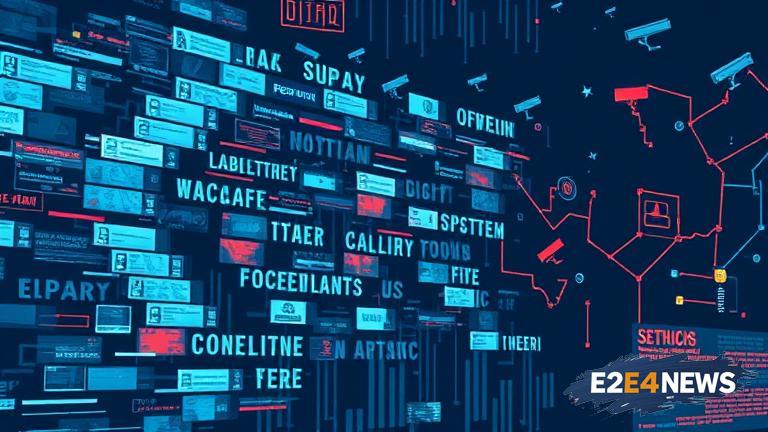The United States government has been conducting a full spectrum of criminal surveillance on its citizens, raising serious concerns about civil liberties and privacy. This surveillance includes the use of advanced technologies such as facial recognition software, cell phone tracking, and social media monitoring. The government has also been using human informants and undercover agents to gather information on individuals and groups. The surveillance activities are often conducted without warrants or probable cause, and the information gathered is frequently used to target and harass individuals who are exercising their constitutional rights. The use of surveillance has become so pervasive that it has created a culture of fear and mistrust among the population. Many people are now hesitant to express their opinions or participate in public activities due to the fear of being monitored and targeted by the government. The surveillance state has also had a chilling effect on free speech and assembly, as individuals are reluctant to engage in activities that may be perceived as dissent or opposition to the government. The government’s surveillance activities have also been criticized for targeting specific groups, such as minorities and political activists. The use of surveillance has also been linked to the erosion of civil liberties, as individuals are increasingly being detained and arrested without due process. The government’s surveillance activities are often shrouded in secrecy, making it difficult for citizens to know the full extent of the monitoring and to hold the government accountable. The lack of transparency and oversight has also led to abuses of power and the misuse of surveillance information. The surveillance state has also had significant economic and social costs, as it has created a climate of fear and mistrust that can stifle innovation and creativity. The government’s surveillance activities have also been criticized for being ineffective in preventing crime and terrorism, as many of the surveillance programs have been shown to be inefficient and wasteful. Despite the concerns and criticisms, the government continues to expand its surveillance activities, with new technologies and tactics being developed and implemented. The use of artificial intelligence and machine learning algorithms has also raised concerns about the potential for bias and discrimination in the surveillance state. The government’s surveillance activities have also been linked to the rise of the national security state, which has prioritized security over civil liberties and individual rights. The surveillance state has also had significant implications for the relationship between the government and citizens, as it has created a power imbalance that can be used to manipulate and control individuals. The government’s surveillance activities have also been criticized for being a form of social control, as they can be used to monitor and regulate the behavior of individuals and groups. The use of surveillance has also been linked to the erosion of trust in institutions, as citizens become increasingly skeptical of the government’s motives and actions. The government’s surveillance activities have also been criticized for being a threat to democracy, as they can be used to undermine the rule of law and the principles of accountability and transparency. The surveillance state has also had significant implications for the future of civil liberties and individual rights, as it has created a climate of fear and mistrust that can be used to justify further erosions of freedom and autonomy. The government’s surveillance activities have also been linked to the rise of authoritarianism, as the use of surveillance and social control can be used to manipulate and dominate individuals and groups. The use of surveillance has also been criticized for being a form of psychological warfare, as it can be used to create a climate of fear and anxiety that can be used to control and manipulate individuals. The government’s surveillance activities have also been linked to the erosion of cultural and social norms, as the use of surveillance and social control can be used to regulate and manipulate the behavior of individuals and groups. The surveillance state has also had significant implications for the relationship between the government and the media, as it has created a power imbalance that can be used to manipulate and control the flow of information. The government’s surveillance activities have also been criticized for being a threat to the integrity of the electoral process, as the use of surveillance and social control can be used to manipulate and influence the behavior of voters. The use of surveillance has also been linked to the rise of disinformation and propaganda, as the government can use surveillance information to create and disseminate false or misleading information. The government’s surveillance activities have also been criticized for being a form of censorship, as the use of surveillance and social control can be used to regulate and manipulate the flow of information. The surveillance state has also had significant implications for the future of individual freedom and autonomy, as it has created a climate of fear and mistrust that can be used to justify further erosions of civil liberties and individual rights.
